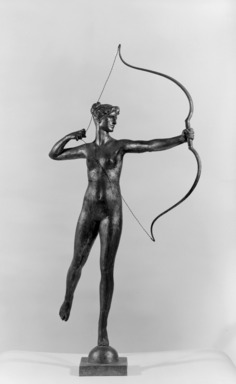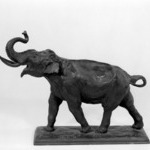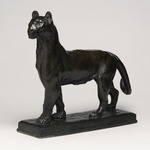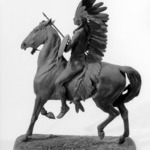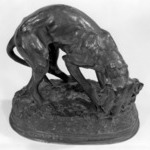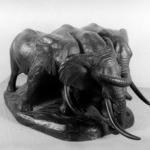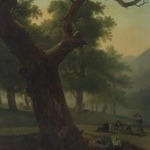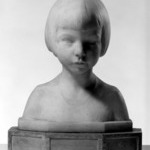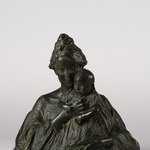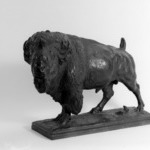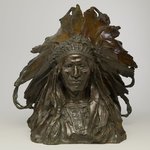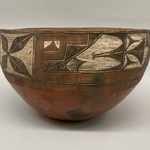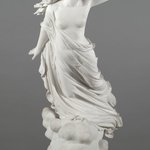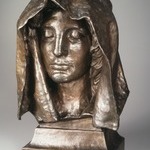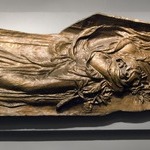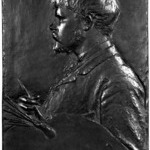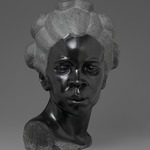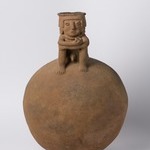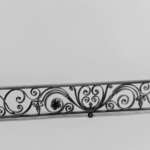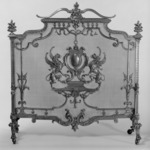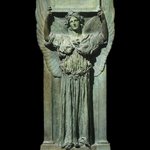Diana of the Tower
Augustus Saint-Gaudens
American Art
Diana of the Tower is a variation of Augustus Saint-Gaudens's famous weathervane of the Roman goddess of the hunt that stood atop the Madison Square Garden Tower in New York City from 1894 until the Garden was demolished in 1925. Despite the weathervane's placement high above the city, the figure's nudity disturbed some viewers. Reporters fueled debates about the sculpture's propriety. "Occasionally a stray child may still be seen [in the area of Madison Square Park]," one wrote, "but more generally, what children come there are rushed through at breakneak speed in the two of a nurse of some older person. In their place the Square is now thronged with clubmen, armed with filed glasses." Nevertheless, Diana's popularity was great enough to inspire the sculptor to create several editions of reduced versions such as this one, the sales and exhibitions of which established Diana as on of the best-known American sculptures of the period.
MEDIUM
Gilded Bronze
DATES
1895
DIMENSIONS
40 7/8 x 20 7/8 x 15 3/4 in. (103.8 x 53 x 40 cm)
(show scale)
SIGNATURE
Incised on back edge of base: "© AUGUSTUS SAINT-GAUDENS 1895 [date in circle]"
ACCESSION NUMBER
23.255
CREDIT LINE
Robert B. Woodward Memorial Fund
PROVENANCE
1907, inherited from the artist by Augusta Fisher Homer Saint-Gaudens (Mrs. Augustus Saint-Gaudens) of Windsor, VT; December 7, 1923, purchased from Augusta Fisher Homer Saint-Gaudens to the Brooklyn Museum.
Provenance FAQ
CATALOGUE DESCRIPTION
Figure of idealized nude female in act of shooting an arrow; stands on tiptoe of proper left foot with right leg outstretched behind her and head looking left; holds bow in proper left hand and pulls string (made of twisted wire) with right hand, arrow has been lost; base is hemisphere atop square plinth.
Condition: Good; allover losses to gilding.
MUSEUM LOCATION
This item is not on view
CAPTION
Augustus Saint-Gaudens (American, born Ireland, 1848–1907). Diana of the Tower, 1895. Gilded Bronze, 40 7/8 x 20 7/8 x 15 3/4 in. (103.8 x 53 x 40 cm). Brooklyn Museum, Robert B. Woodward Memorial Fund, 23.255. Creative Commons-BY (Photo: Brooklyn Museum, 23.255_bw.jpg)
IMAGE
overall, 23.255_bw.jpg. Brooklyn Museum photograph
"CUR" at the beginning of an image file name means that the image was created by a curatorial staff member. These study images may be digital point-and-shoot photographs, when we don\'t yet have high-quality studio photography, or they may be scans of older negatives, slides, or photographic prints, providing historical documentation of the object.
RIGHTS STATEMENT
Creative Commons-BY
You may download and use Brooklyn Museum images of this three-dimensional work in accordance with a
Creative Commons license. Fair use, as understood under the United States Copyright Act, may also apply.
Please include caption information from this page and credit the Brooklyn Museum. If you need a high resolution file, please fill out our online
application form (charges apply).
For further information about copyright, we recommend resources at the
United States Library of Congress,
Cornell University,
Copyright and Cultural Institutions: Guidelines for U.S. Libraries, Archives, and Museums, and
Copyright Watch.
For more information about the Museum's rights project, including how rights types are assigned, please see our
blog posts on copyright.
If you have any information regarding this work and rights to it, please contact
copyright@brooklynmuseum.org.
RECORD COMPLETENESS
Not every record you will find here is complete. More information is available for some works than for others, and some entries have been updated more recently. Records are frequently reviewed and revised, and
we welcome any additional information you might have.
Is the arrow missing or was this sculpted without one?
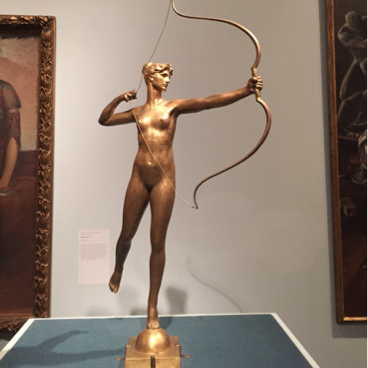
The arrow has been lost over time.
"Diana of the Tower" is a variation of Augustus Saint-Gaudens's famous weathervane of the Roman goddess of the hunt that stood atop the Madison Square Garden Tower in New York City from 1894 until the Garden was demolished in 1925.
